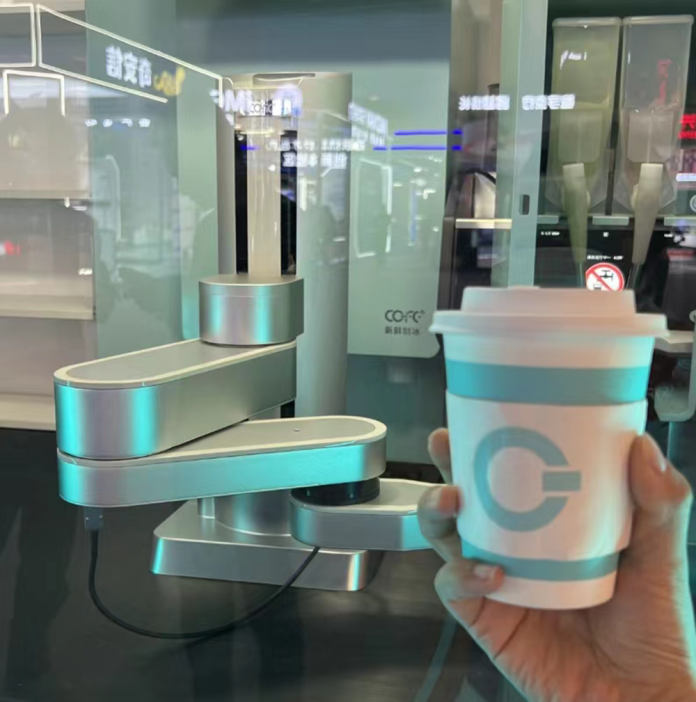“Our COFE+, as a Fresh Ground Robot Café, makes a cup of coffee every 50 seconds on average and can produce more than a thousand cups of coffee continuously within 24 hours. In addition to coffee, more than 50 flavors of drinks, including freshly made milk tea, matcha, chocolate and dairy drinks, are also on its menu. It is estimated that one employee could manage 5-10 such robot Café, greatly saving the labor, rent and other costs of traditional physical shops.” A staff member of Shanghai-based Hi-Dolphin Robot Technology Co., Ltd. introduced the reporter orderly while serving a cup of coffee.
At the ongoing 4th Global Digital Economy Conference 2024 (CDEC), a “barista” that does not need to eat and rest has attracted the attention of visitors at home and abroad.
“We are the first batch of coffee robots in China to obtain a license for freshly prepared and sold food, as well as the first coffee robot in China to be exported to dozens of developed countries and regions such as Europe Union, the United States, Australia, Germany, Japan, and South Korea.” The COFE+ founder noted, “Now, our system supports three languages: Chinese, English, and Japanese. For products exported overseas, we have adapted to the payment method that local people are accustomed to using, namely swiping cards instead of scanning codes, thus provide a card swiping function.”
In the digital immersive experience area of the CDEC, except for robots, cutting-edge technologies such as large models, metaverse, and chips were unveiled in succession.
“Our brand-new 3D camera takes only one second to take a picture, then the modeling is completed in 5 to 8 minutes. The generated three-dimensional image, which we call a digital avatar, could be implanted into some game scenes or virtual scenes in film and television, and also for campus teaching, scenic spot explanations, etc. Not only limited to domestic markets, we also welcome overseas agents or partners. Now, our team are negotiating with Asian partners from Japan, South Korea and so on,” a business manager from Hangzhou ustyle Technology Co., Ltd. introduced.

“UCAM 3D has a total of 140 cameras, with up to 500 million pixels, and the amount of human body point cloud data reaches more than 3 million. It will be committed to building a top-notch 3D digital avatar service platform to rapidly promote the development of the global metaverse industry.”
How to ensure data security in the virtual metaverse? At the booth of Beijing SuperRed Technology Co. Ltd., the reporter learned that the latest iris VR device can protect the digital assets of users in the virtual world.

“Human fingerprints have more than 10 feature points, faces have about 30, but a single iris has a total of 266 feature points, and they remain unchanged for life after eight months of birth.” A staff member introduced that in the metaverse world, users only need to wear VR iris equipment to quickly verify their identity.
It is worth mentioning that the Global Digital Economy White Paper released during the conference on July 3 shows that by the first quarter of 2024, there has nearly 30,000 AI companies worldwide, with the United States accounting for 34% and China accounting for 15%. By 2024, there are 1,328 large AI models in the world, with the United States accounting for 44% and China accounting for 36%. Notably, China’s 5G base stations already account for 60% of the world’s total. There is no doubt that a silent storm of data and circuits is sweeping every corner of the earth.


